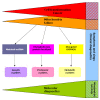Molecular oncology focus - is carcinogenesis a 'mitochondriopathy'?
- PMID: 20416110
- PMCID: PMC2876137
- DOI: 10.1186/1423-0127-17-31
Molecular oncology focus - is carcinogenesis a 'mitochondriopathy'?
Abstract
Mitochondria are sub-cellular organelles that produce adenosine triphosphate (ATP) through oxidative phosphorylation (OXPHOS). As suggested over 70 years ago by Otto Warburg and recently confirmed with molecular techniques, alterations in respiratory activity and in mitochondrial DNA (mtDNA) appear to be common features of malignant cells. Somatic mtDNA mutations have been reported in many types of cancer cells, and some reports document the prevalence of inherited mitochondrial DNA polymorphisms in cancer patients. Nevertheless, a careful reanalysis of methodological criteria and methodology applied in those reports has shown that numerous papers can't be used as relevant sources of data for systematic review, meta-analysis, or finally for establishment of clinically applicable markers. In this review technical and conceptual errors commonly occurring in the literature are summarized. In the first place we discuss, why many of the published papers cannot be used as a valid and clinically useful sources of evidence in the biomedical and healthcare contexts. The reasons for introduction of noise in data and in consequence - bias for the interpretation of the role of mitochondrial DNA in the complex process of tumorigenesis are listed. In the second part of the text practical aspects of mtDNA research and requirements necessary to fulfill in order to use mtDNA analysis in clinics are shown. Stringent methodological criteria of a case-controlled experiment in molecular medicine are indicated. In the third part we suggest, what lessons can be learned for the future and propose guidelines for mtDNA analysis in oncology. Finally we conclude that, although several conceptual and methodological difficulties hinder the research on mitochondrial patho-physiology in cancer cells, this area of molecular medicine should be considered of high importance for future clinical practice.
Figures


References
-
- Czarnecka AM, Marino Gammazza A, Di Felice V, Zummo G, Cappello F. Cancer as a "Mitochondriopathy". J Cancer Mol. 2007;3:71–79.
-
- Plak K, Czarnecka AM, Krawczyk T, Golik P, Bartnik E. Breast cancer as a mitochondrial disorder (Review) Oncol Rep. 2009;21:845–851. - PubMed
Publication types
MeSH terms
Substances
LinkOut - more resources
Full Text Sources
Medical
Research Materials

